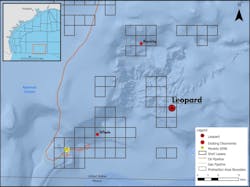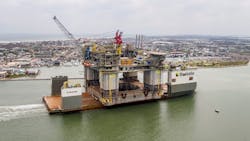Shell makes deepwater discovery at Leopard prospect
Shell makes deepwater discovery at Leopard prospect
Shell Offshore Inc. says it has made a significant oil discovery at the Leopard prospect in Alaminos Canyon block 691 in the deepwater US Gulf of Mexico.
The Leopard well encountered more than 600 ft (183 m) net oil pay at multiple levels. Evaluation is ongoing to further define development options, the company said.
Leopard is operated by Shell (50%) and co-owned by Chevron U.S.A. Inc. (50%).
Transocean’s ultra-deepwater drillship Deepwater Thalassa drilled the discovery well in 6,800 ft (2,070 m) of water, Shell confirmed in an email to Offshore.
Paul Goodfellow, Shell’s Deepwater Executive Vice President, said: “Leopard expands our leading position in the Gulf of Mexico and is an exciting addition to our core portfolio, especially given its proximity to existing infrastructure and other discoveries in the Perdido Corridor.”
Goodfellow continued: “With our US Gulf of Mexico production among the lowest GHG intensity in the world, Shell remains confident about the GoM and this latest discovery will help us deliver on our strategy to focus on valuable, high margin barrels as we sustain material Upstream cash flows into the 2030s.”
According to the company, Leopard is an opportunity to increase production in the Perdido Corridor, where its Great White, Silvertip, and Tobago fields are already producing. The Whale discovery, also in the Perdido Corridor, is progressing toward a final investment decision in 2021.
Leopard is about 20 mi (32 km) east of the Whale discovery, 20 mi (32 km) south of the recently appraised Blacktip discovery, and 33 mi (53 km) from the Perdido host.
McDermott wins Trion FPU FEED contract
BHP has awarded McDermott International Ltd. a front-end engineering design (FEED) contract for the deepwater Trion field development offshore Mexico.
The scope of the contract includes engineering tasks related to the configuration, sizing, and analysis of the semisubmersible floating production unit (FPU), including topsides, hull, risers, and mooring. McDermott was previously awarded and completed services under an initial pre-FEED contract.
The company will lead one integrated team to perform project management and execution planning.
The FPU will be designed for a water depth of about 8,200 ft (2,500 m). The Trion field is about 19 mi (30 km) south of the US/Mexico border and approximately 112 mi (180 km) off the Mexican coastline.
BHP is the operator and holds a 60% interest in Trion. PEMEX holds the remaining 40% interest.
BSEE inspects Mad Dog 2 production platform
The Bureau of Safety and Environmental Enforcement (BSEE) inspectors and engineers have concluded a three-day pre-production inspection on the Argos, bp’s new 60,000-ton platform slated for operation in the Gulf of Mexico.
The pre-production inspection team’s goal is to verify that all safety equipment, components, and production processes aboard the structure have been constructed as planned, meet industry standards, and comply with federal regulations. BSEE’s on-site inspection is one of the steps required to clear the platform for sailing to its planned destination in the deepwater Gulf of Mexico.
The inspection was conducted by a team of seven inspectors and engineers divided into two units, each simultaneously inspecting different areas of the facility for three consecutive days.
BSEE Houma District Manager Amy Pellegrin said: “During the pre-production inspection, we make certain that all safety devices are installed correctly and according to the facility drawings in the permit that bp originally submitted to BSEE. bp will subsequently be required to make revisions as necessary.”
After the onshore pre-production process is complete, the Argos will sail to the Green Canyon area of the Gulf, about 190 mi (306 km) south of New Orleans. Water depth is about 4,500 ft (1,372 m). After the Argos is moved to its permanent location, BSEE engineers and inspectors will perform an additional inspection before production can begin.
“These regulatory inspections help ensure that the Argos meets all environmental compliance and applicable safety rules, regulations and practices,” Pellegrin added.
The Argos is part of BP’s Mad Dog 2 project, which is expected to begin production next year.
About the Author
Bruce Beaubouef
Managing Editor
Bruce Beaubouef is Managing Editor for Offshore magazine. In that capacity, he plans and oversees content for the magazine; writes features on technologies and trends for the magazine; writes news updates for the website; creates and moderates topical webinars; and creates videos that focus on offshore oil and gas and renewable energies. Beaubouef has been in the oil and gas trade media for 25 years, starting out as Editor of Hart’s Pipeline Digest in 1998. From there, he went on to serve as Associate Editor for Pipe Line and Gas Industry for Gulf Publishing for four years before rejoining Hart Publications as Editor of PipeLine and Gas Technology in 2003. He joined Offshore magazine as Managing Editor in 2010, at that time owned by PennWell Corp. Beaubouef earned his Ph.D. at the University of Houston in 1997, and his dissertation was published in book form by Texas A&M University Press in September 2007 as The Strategic Petroleum Reserve: U.S. Energy Security and Oil Politics, 1975-2005.


